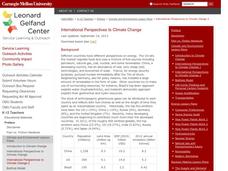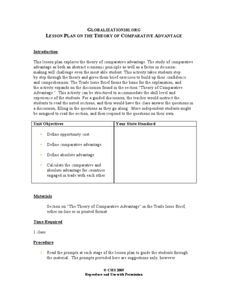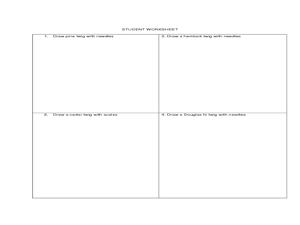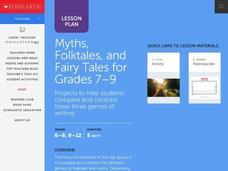University of Minnesota
Memory Items
Ready to have an "unforgettable" time in science class? Try a fun and insightful activity, suitable for a wide age group of learners. Explore how human memory works when pupils try to remember objects they've seen before comparing the...
Pace University
Grade 6-8 Living Things
What characterizes a living thing? Scholars explore the concept during a differentiated instruction unit on living things. They perform lab experiments to determine how animals adapt to stimuli, watch videos and learn about...
Anti-Defamation League
The Revealers: Discussion Guide for Grades 6-8
Suspense! Rebellion! Cyberbullying! No wonder Doug Wilhelm's novel The Revealers appeals to middle schoolers. Instructors new to using the novel and experienced veterans will find this discussion guide invaluable. Discussion questions,...
Core Knowledge Foundation
Fairy Tales Tell It Again!™ Read-Aloud Anthology
A read-aloud anthology explores the fantasy worlds of fairy tales. Thirteen lessons challenge scholars to listen to and discuss a text, complete word work, then participate in extension activities—assessments and culminating activities...
Curated OER
This Dynamic Earth: The Story of Plate Tectonics
Discuss Earth's tectonic plates at middle school level with an informative presentation. Packed with maps, satellite images, diagrams, and photographs, the slideshow connects with any curriculum focused on plate tectonics. It...
Carnegie Mellon University
International Perspectives to Climate Change 2
A couple PowerPoint presentations are used to stimulate discussion about the perspectives of different countries on the issue of energy consumption. Afterward, they play a game in which each team is assigned a country, considers its...
Federal Reserve Bank
GDP: Does It Measure Up?
Here is resource that offers a very clear explanation for how economists measure economic growth by comparing real GDP over time. There is also an additional worksheet that details the expenditure method and four components for...
National Endowment for the Humanities
Galileo: Revealing the Universe
To gain an understanding of the significance of Galileo Galilei's revolutionary ideas, class members watch the short video "Stargazing Before Galileo," and conduct a close reading of Galileo's Sidereal Messsenger. They then compare...
Curated OER
Construction of a Microscale Fuel Cell
Fuel cells are being called the "energy source" of the future. Allow your high school chemistry class to construct a miscroscale fuel cell, complete with all components to generate energy. This engaging activity will allow them to apply...
K12 Reader
If
Rudyard Kipling's advice to his son in the poem "If" is a resounding message that echoes through generations. After reading the famous poem, middle schoolers work on analyzing specific lines, completing activities based on unfamiliar...
Virginia Department of Education
Metals, Nonmetals, and Metalloids
How can one easily classify metals, nonmetals, and metalloids? Pupils answer this question as they experiment with unknown substances and perform tests on conductivity, brittleness, and malleability to determine which unknown belongs in...
National Wildlife Federation
Wherefore Art Thou, Albedo?
In the sixth lesson in a series of 21, scholars use NASA data to graph and interpret albedo seasonally and over the course of multiple years. This allows learners to compare albedo trends to changes in sea ice with connections to the...
Curated OER
Lesson Plan on the Theory of Comparative Advantage
Twelfth graders practice using new vocabulary related to economics. They discover how to calculate comparative and absolute advantage. They also read different articles about the topic.
Curated OER
Compare and Contrast
Third graders compare the past and present daily life of West Bloomfield and Wilmington, North Carolina using narratives and graphic data. The create a table comparing and contrasting the two communities.
Curated OER
ESL Comparative Adjectives
In these English Language adjectives worksheets, students complete several activities that help them identify comparative adjectives that end in 'er.' Students complete both conversational and writing exercises for the comparative...
Curated OER
Comparing Deciduous and Evergreen Trees
Learners investigate nature by identifying different plants and trees. In this environmental field trip, students participate in a British Columbia expedition in which they identify cedar, pine, hemlock and Douglas fir trees. Learners...
Curated OER
Comparing Sea Horses and Knights
Learners investigate sea horses and knights. In this marine biology lesson, students read the book How to Hide an Octopus and discuss the purpose of camoflage. Learners research knights and sea horses and record their research on their...
Curated OER
Comparing North American Colonies Vs. Britain
Fifth graders practice creative writing by describing events from the Colonial era. In this U.S. History lesson, 5th graders identify King George III and George Washington, the roles they played, and the differences between them. ...
Curated OER
Activity 2: How Do You Get Your Energy?
Students receive informational handouts about photosynthesis, chemosynthesis and tubeworms (included with the lesson). Using the "Bacteriology Experiment Plan" handout, students compare the amount of bacteria found in two locations. They...
Scholastic
Myths, Folktales, & Fairy Tales for Grades 7-9
Here is a must-have resource for studying fairy tales, myths, and folktales with your class! It includes instructional ideas, activities, and materials to support a month-long review of these three unique genres of writing.
Classroom Adventures Program
Creating Characters
Examine character in depth. Over the course of these six lessons, learners explore their own character traits, determine the traits of characters in the books they read, practice comparing and contrasting, and collaborate in small groups...
It's About Time
Polymers
All plastics contain polymers, but not all polymers are plastic. Young chemists make their own polymer and compare the properties to those of other states of matter. After a reading passage, pupils answer analysis questions about natural...
Illustrative Mathematics
Running Around a Track II
On your mark, get set, GO! The class sprints toward the conclusions in a race analysis activity. The staggered start of the 400-m foot race is taken apart in detail, and then learners step back and develop some overall race strategy and...
Curated OER
Two Views of the Slave Ship Brookes
Actual ship diagrams and a table of voyage data gives young historians an authentic glimpse of on-board experiences during the Atlantic Slave Trade. The class examines a projected diagram of the slave ship Brooks, recording thoughts....

























